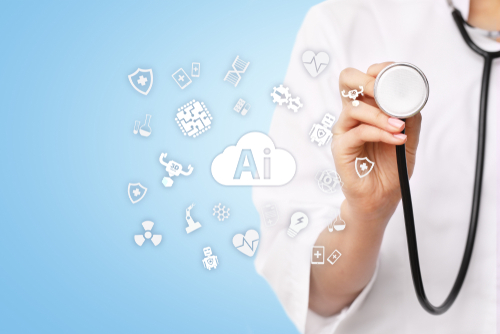Healthcare isn’t only a big business, it’s serious business. AI is making its mark in the field as well. Here’s how AI in healthcare is improving things in a big way.
Data analytics is very beneficial today. One of the ways that it’s helping is by creating better healthcare systems. This is especially true of AI. Its impact on every healthcare organization and its patients is undeniable. Unfortunately, this isn’t going to be a slow change, but one that happens much faster than what this industry is used to. This isn’t bothering most healthcare practitioners today though because they’re noticing that this impact is the exact change that healthcare needs so that it can improve outcomes, lower costs, and give patients the improved care and experiences they deserve. Of course, these are only a handful of the things it can do for your healthcare practice. You’ll want to take a moment to see what else it can do for you.
Providing Expert Consultations Online
Health IT Outcomes says when doctors have access to almost limitless data they’re able to provide better treatment outcomes for their patients. However, when patients have this same information, they can avoid treatment altogether. This is because telemedicine devices that are powered by healthcare AI help patients search through the same trusted data sources their doctors use. In doing so they’re able to determine whether their symptoms warrant a doctor’s visit. This is one of the many reasons why AI-driven apps like Ada are growing more popular among both patients and providers alike. This app has a consumer-friendly front end that empowers patients to make better decisions and be more proactive in their own healthcare.
The need for AI in Health Care
Horton Works says healthcare workers facing staff shortages need all the help they can get from the updated technology. About 48% of nurses will admit that staff shortages are a major problem today. Doctors (in specific, residents), spend 80 hours in the hospital each week, often working 28-hour shifts. Coupled with the stress of their jobs, it’s no wonder errors occur. This is particularly true when dealing with finding patterns in data – a tedious process that machines are better suited for, especially when there are many variables or scenarios to reference. Fortunately, artificial intelligence (AI) can step in and point out signals that well-meaning physicians may otherwise miss. This is because AI can use historical models to process large amounts of data that it then processes with new data to find similarities that aren’t immediately evident to humans.
Future of AI in Health Care
There are tools available that manage these large volumes of data and audit who has access to this information. When you’ve created the right platforms to manage this medical data you’ll have a solid foundation for future AI developments. As AI algorithms become more sophisticated, we’re seeing cognitive computing tools that can digest large amounts of natural-language medical research and condense it into a corpus of knowledge that rivals any modern physician. Of course, this doesn’t mean that the future doctors will all be digital since human understanding, intuition, and empathy are equally important and will always have a place in healthcare. What it does mean though is that tomorrow’s doctors will be better informed, more confident, and much less stressed because they’ll exist in a digital ecosystem that supports their decision-making processes and reduces the probability of error.
AI for the Patient Experience
Search Health Hit says that an AI-powered business phone system for communication will also help improve the patient experience and satisfaction even when patients are at home. There are several ways in which this happens, including:
- AI-based messaging enables patient engagement. This means patients can get access to their lab results and receive the appointment and medication reminders.
- Amazon Alexa does more than check the weather and play music. It can act as a healthcare assistant that improves the patient experience. When used in hospital rooms, it can improve patient satisfaction by providing access to the hospital directory or dietary system.
- AI as a patient education and coaching tool is very beneficial, especially when you’re monitoring patients who have any type of chronic condition. For them, AI can act as a health coach.
Improve Outcomes With AI
When AI is used for patient data analysis it can be a real boon to health care providers since it’s able to quickly analyze large amounts of information. As it does so, AI is able to flag anything that seems out of the ordinary and send an alert to a human physician so they can review it further. In doing so, doctors can now take note of which patients need more intervention post-discharge. This can also be beneficial in several other ways, including:
- AI helps reduce readmissions. This is because providers can use healthcare AI to better predict which patients have a high risk of being readmitted to the hospital and prioritize patients who may need further intervention after leaving the hospital.
- AI helps personalize patient discharge plans so they fit the patient’s circumstances, taking into consideration things like their environmental and socioeconomic factors.
- Healthcare AI has lifesaving benefits. There’s a myriad of uses for diagnostics, including detecting heart attack risk from retinal images and flagging mammograms for further review by a radiologist.
- AI tools help hospitals provide patients with better treatments. This is because AI can analyze patient data and determine new care paths for a variety of conditions like sepsis and pneumonia.
Conclusion
AI-powered healthcare and electronic health records are exciting prospects. However, there are many challenges it’s facing. While these will ultimately help improve patient outcomes, they’re also so significant that some practitioners are hesitating. Those healthcare organizations that are ready for change must still contend with the costs of upgrading. Technology is expensive – something both patients and providers must pay close attention to. However, the benefits are immediately obvious and just as significant. It’s also grown very easy to implement this technology today because it’s been designed to interact with other forms of AI. All this is great and would also be very reasonably priced if companies like Amazon didn’t invade the market with more affordable solutions thus causing IT companies to increase their prices.







